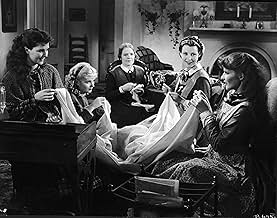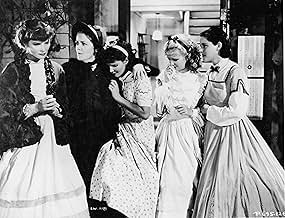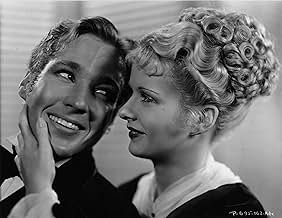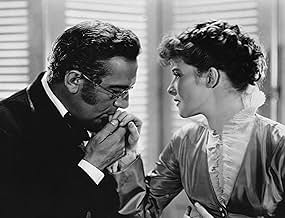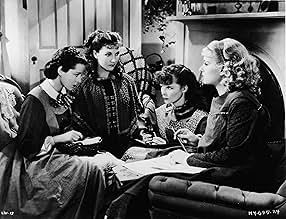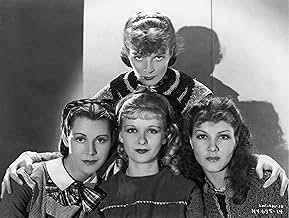NOTE IMDb
7,1/10
8,3 k
MA NOTE
Ajouter une intrigue dans votre langueA chronicle of the lives of sisters growing up in 19th-century New England.A chronicle of the lives of sisters growing up in 19th-century New England.A chronicle of the lives of sisters growing up in 19th-century New England.
- Réalisation
- Scénario
- Casting principal
- Récompensé par 1 Oscar
- 7 victoires et 4 nominations au total
John Lodge
- Brooke
- (as John Davis Lodge)
Samuel S. Hinds
- Mr. March
- (as Samuel Hinds)
Nina Borget
- Housekeeper
- (non crédité)
Francesca Braggiotti
- Dance Teacher
- (non crédité)
Luke Cosgrave
- Old Man
- (non crédité)
Avis à la une
It's always a wonderful feeling when a film works its wonders on you. LITTLE WOMEN had that effect on me, and I'm not even a fan of these types of stories. This adaptation of the Louisa May Alcott classic has real heart, warmth, and the right amount of sentimentality, amounting to a wonderful film. Katharine Hepburn stars as the tomboyish Jo, a free-spirited young lady who is dying for adventure but craves the time she spends with her sisters. The one that stands out among the four is Beth, a caring, sweet girl with a flair for the piano. If you don't get teary-eyed about her cause, you definitely pass for a curmudgeon. The only complaint I have about this gem is that the last quarter of the film doesn't seem to have the matching effervescence that the rest of the film had. It ends abruptly and off-balance. All qualms aside, this is a genuine classic, filled with great performances and characters you can't help but like. A true family entertainment. Rating: Three stars and a half.
LITTLE WOMEN is quite possibly the one book written post-Shakespeare that has the most number of film adaptations to its credit. Louisa May Alcott's novel, after all, offers a fine host of roles, particularly for women--of the March girls alone, there's the eldest sister Meg; the frail but saintly Beth; spoilt baby of the family Amy; and last but most certainly not least, spunky tomboy Jo. (This is not to forget the smaller, but still integral, supporting roles of Laurie, Mr Lawrence, Professor Bhaer, and of course, Marmee March.) The story is an engaging one too, following the lives of the March sisters--in particular Jo--as they grow and deal with change, with love, and even with death. Even though the story itself is tied to a particular setting in the 1860s (and even then the historical setting is almost peripheral), the characters and their relationships with one another--siblings, parent/children, friends and lovers--are simply timeless. That's probably why the novel has seen as many attempts to have it committed to film as it has.
I hate to make a snap judgement, having not seen any more versions of Little Women than the 1994 one, but I believe that this version, made by RKO studios and starring a delightful Katharine Hepburn as Jo March, has every right to be considered the definitive film version of the Alcott novel. The writing, for one thing, is exceptional. Although never quite the novel's substitute, it condenses the book marvellously, sketching the characters and relationships of the girls quickly and efficiently, and never skipping over the best parts of the book (for example, Laurie's profession of love for Jo). Of course the screenplay will never measure up to the book--it is rare that a film could surpass the wealth of detail and beauty of description available from the written word. But nothing's perfect, and this screenplay, by Sarah Y. Mason and Victor Heerman, is as close as an adaptation can get while retaining its own distinct flavour as a film.
As for the casting, I have very few complaints about it, since Hepburn--all angles and attitude, all loud-voiced and tomboyish--is perfect as Jo and is ably supported by Frances Dee as Meg, Henry Stephenson as the sweetly paternal Mr. Laurence and Douglass Montgomery as Laurie (though he plays the role a tad too fey for my liking). Special praise must be reserved for both Jean Parker (Beth March) and Paul Lukas (Professor Fritz Bhaer): Parker for bringing an impossibly sweet and lovely character to life, and making the audience genuinely grieve for Beth when she takes her leave of her family; Lukas for managing to avoid making Professor Bhaer a hard, frightening man with whom the audience simply cannot imagine Jo being in love (as is *my* impression from the book). I was rather disappointed with Joan Bennett as Amy, and that is of course partly attributable to the fact that the character isn't particularly sympathetic in the novel either, so it isn't really fair to expect a miracle from Bennett. Still, Bennett seemed to me to be the most lifeless of the sisters--one might think this an unfair judgement, since anyone acting opposite the powder keg that is Katharine Hepburn could easily be deemed lifeless if he or she weren't able to hold his/her own against her. Still, the arguably less well-known Frances Dee and Jean Parker had no problem with it.
In the final analysis though, there is no doubt that this film, however 'ensemble' the cast, belongs only to Hepburn. Her performance, although somewhat mannered and brassy at times (not necessarily simultaneously, thank goodness!), is nothing short of brilliant. She's sad, she's funny, she's touching, and as she does in her best roles, she transcends her own (pretty formidable!) character to breathe life into Jo as only she can. Witness the simple scene in which Jo breaks down, alone, at night, after having sold her hair for her mother's travel expenses... or the scene when Jo truly believes that scarlet fever is going to take Beth from her, and she trudges up into her own attic, the weight of the world on her shoulders, and collapses into tears. There is also nothing more charming than Hepburn as she gallops down the stairs in a frock which she burnt by leaning against the fireplace, or when she runs like a free, untamed spirit through the woods when chased by Laurie. Strange, sweet, funny Jo--this complex combination of jealous child and strong woman, stubbornly refusing to relinquish the familiar while adamantly placing her family above her own interests always... it really is a role that seems to have been written for Hepburn, just as she seems to have been born to play it. It is perhaps for LITTLE WOMEN as much as for MORNING GLORY (released in the same year) that Hepburn won her first Oscar in 1933. Nobody photographs Hepburn as flatteringly as her good friend and director George Cukor either, so some of the close-up shots of her in LITTLE WOMEN are simply breathtaking in having managed to capture her beauty, her youth and her personality all at once.
Nothing about this film is perfect; after all, perfection is too high a standard to be applied to adaptations (and most other films!). But LITTLE WOMEN really does have a little something to offer everybody--a sweet, timeless story about love and growing up and family. It's something that everyone can relate to, and that's probably more than enough.
I hate to make a snap judgement, having not seen any more versions of Little Women than the 1994 one, but I believe that this version, made by RKO studios and starring a delightful Katharine Hepburn as Jo March, has every right to be considered the definitive film version of the Alcott novel. The writing, for one thing, is exceptional. Although never quite the novel's substitute, it condenses the book marvellously, sketching the characters and relationships of the girls quickly and efficiently, and never skipping over the best parts of the book (for example, Laurie's profession of love for Jo). Of course the screenplay will never measure up to the book--it is rare that a film could surpass the wealth of detail and beauty of description available from the written word. But nothing's perfect, and this screenplay, by Sarah Y. Mason and Victor Heerman, is as close as an adaptation can get while retaining its own distinct flavour as a film.
As for the casting, I have very few complaints about it, since Hepburn--all angles and attitude, all loud-voiced and tomboyish--is perfect as Jo and is ably supported by Frances Dee as Meg, Henry Stephenson as the sweetly paternal Mr. Laurence and Douglass Montgomery as Laurie (though he plays the role a tad too fey for my liking). Special praise must be reserved for both Jean Parker (Beth March) and Paul Lukas (Professor Fritz Bhaer): Parker for bringing an impossibly sweet and lovely character to life, and making the audience genuinely grieve for Beth when she takes her leave of her family; Lukas for managing to avoid making Professor Bhaer a hard, frightening man with whom the audience simply cannot imagine Jo being in love (as is *my* impression from the book). I was rather disappointed with Joan Bennett as Amy, and that is of course partly attributable to the fact that the character isn't particularly sympathetic in the novel either, so it isn't really fair to expect a miracle from Bennett. Still, Bennett seemed to me to be the most lifeless of the sisters--one might think this an unfair judgement, since anyone acting opposite the powder keg that is Katharine Hepburn could easily be deemed lifeless if he or she weren't able to hold his/her own against her. Still, the arguably less well-known Frances Dee and Jean Parker had no problem with it.
In the final analysis though, there is no doubt that this film, however 'ensemble' the cast, belongs only to Hepburn. Her performance, although somewhat mannered and brassy at times (not necessarily simultaneously, thank goodness!), is nothing short of brilliant. She's sad, she's funny, she's touching, and as she does in her best roles, she transcends her own (pretty formidable!) character to breathe life into Jo as only she can. Witness the simple scene in which Jo breaks down, alone, at night, after having sold her hair for her mother's travel expenses... or the scene when Jo truly believes that scarlet fever is going to take Beth from her, and she trudges up into her own attic, the weight of the world on her shoulders, and collapses into tears. There is also nothing more charming than Hepburn as she gallops down the stairs in a frock which she burnt by leaning against the fireplace, or when she runs like a free, untamed spirit through the woods when chased by Laurie. Strange, sweet, funny Jo--this complex combination of jealous child and strong woman, stubbornly refusing to relinquish the familiar while adamantly placing her family above her own interests always... it really is a role that seems to have been written for Hepburn, just as she seems to have been born to play it. It is perhaps for LITTLE WOMEN as much as for MORNING GLORY (released in the same year) that Hepburn won her first Oscar in 1933. Nobody photographs Hepburn as flatteringly as her good friend and director George Cukor either, so some of the close-up shots of her in LITTLE WOMEN are simply breathtaking in having managed to capture her beauty, her youth and her personality all at once.
Nothing about this film is perfect; after all, perfection is too high a standard to be applied to adaptations (and most other films!). But LITTLE WOMEN really does have a little something to offer everybody--a sweet, timeless story about love and growing up and family. It's something that everyone can relate to, and that's probably more than enough.
Having grown up with the Technicolor version of the 40s with a young Liz Taylor and a perky June Allyson, I was pleased to find this was just as good a version, better in many ways. Katharine Hepburn, as you might expect, is wonderful as the tomboy Jo March, who finds responsibility after a lifetime of woe for the family. Other cast stand-outs include Edna May Oliver as Aunt March. Laurie is a bit of a wet fish though. Both early versions are much, much better than the Winona Ryder one of the 90s, which was a sentimental Hollywood nostalgia trip which just didn't work. I'm still split between the two early ones but this is a definite favourite and I'd highly recommend it.
In fanfiction there is the phenomenon called the "Mary Sue"--a character who is an (idealized) version of the author who is inserted into the story to act out the author's fantasy. The original Mary Sue was in a Star Trek fanfiction where Ensign Mary Sue was braver than Kirk, smarter than Spock, more compassionate than McCoy, etc. who is able to save the day when nobody else can.
What has this, I hear you ask, to do with 'Little Women'? I think that all the March girls, but especially Jo, are somewhat Mary Sues to Louisa May Alcott. They are just too perfect. Especially Beth. Oscar Wilde said of Dickens' Little Nell that it would take a heart of stone not to laugh out loud reading her death scene; the same remark could apply to Beth. And Marmee is just to saintly and patient to be believed.
Still, in spite of it all, the film was worth watching, especially to see the young Kate Hepburn. I especially appreciate the time when she was asked when she would grow up and act like a proper lady, and she replied, "Never! Even when I'm old and walk with a cane!" (Or something to that effect.) Highly prophetic, as that was exactly how Kate lived.
What has this, I hear you ask, to do with 'Little Women'? I think that all the March girls, but especially Jo, are somewhat Mary Sues to Louisa May Alcott. They are just too perfect. Especially Beth. Oscar Wilde said of Dickens' Little Nell that it would take a heart of stone not to laugh out loud reading her death scene; the same remark could apply to Beth. And Marmee is just to saintly and patient to be believed.
Still, in spite of it all, the film was worth watching, especially to see the young Kate Hepburn. I especially appreciate the time when she was asked when she would grow up and act like a proper lady, and she replied, "Never! Even when I'm old and walk with a cane!" (Or something to that effect.) Highly prophetic, as that was exactly how Kate lived.
Few would deny the powerful presence of Katherine Hepburn in any movie she ever made. In this first screen adaptation with sound of Louisa May Alcott's famous novel, Hepburn IS the movie. That is to say, her part, her lines, her camera time seem to surpass the combined times of all the rest of the cast. While that may be as one would expect for many stories – a star or hero being the focal point of a whole work, this film, based on this book, was supposed to be about several "little women." So, most of the rest of the characters in the film – save a neighbor male friend, really get short shrift. For that reason, and a few others I'll mention, I think this rendition falls short of the interesting story told in the book.
I would like to have seen more development of the sisters than this film has. The later remake – 1949's MGM production, does flesh out all the characters more. The problem with the overly heavy emphasis on the one character in this first movie is that the audience doesn't get much of a sense of who are the rest of the members of the family. So we can't so readily experience the ups and downs, the emotions, the tragedy and love felt between the sisters and their mother.
Hepburn does a very good Jo, but not great. I think her efforts to be the tomboy were overdone in a few instances, which only drew my attention to this aspect of her role. She didn't seem to come by it naturally. One example was when she spoke a couple of times, acting and deliberately mimicking a deep-throated guttural voice for a man. At other times, she seemed to push it a bit and overact in flamboyance of tom-boyish behavior.
There were no other notable performances by other cast members. Paul Lukas as Professor Bhaer and Douglas Montgomery as Laurie were good. Most of the rest were just OK or non-descript. One member was just not right for the role of Marmee. Spring Byington brought no depth or real feel to the role that the viewer could sense. But, then, the film just seemed to glide over the lesser roles.
"Little Women" is a good story in the American library, and this film is enjoyable to watch. But, for a much more involving and endearing film, be sure to see the 1949 rendition by MGM.
I would like to have seen more development of the sisters than this film has. The later remake – 1949's MGM production, does flesh out all the characters more. The problem with the overly heavy emphasis on the one character in this first movie is that the audience doesn't get much of a sense of who are the rest of the members of the family. So we can't so readily experience the ups and downs, the emotions, the tragedy and love felt between the sisters and their mother.
Hepburn does a very good Jo, but not great. I think her efforts to be the tomboy were overdone in a few instances, which only drew my attention to this aspect of her role. She didn't seem to come by it naturally. One example was when she spoke a couple of times, acting and deliberately mimicking a deep-throated guttural voice for a man. At other times, she seemed to push it a bit and overact in flamboyance of tom-boyish behavior.
There were no other notable performances by other cast members. Paul Lukas as Professor Bhaer and Douglas Montgomery as Laurie were good. Most of the rest were just OK or non-descript. One member was just not right for the role of Marmee. Spring Byington brought no depth or real feel to the role that the viewer could sense. But, then, the film just seemed to glide over the lesser roles.
"Little Women" is a good story in the American library, and this film is enjoyable to watch. But, for a much more involving and endearing film, be sure to see the 1949 rendition by MGM.
Le saviez-vous
- AnecdotesKatharine Hepburn asked costume designer Walter Plunkett to copy a dress her maternal grandmother wore in a tintype photograph.
- GaffesIn the Christmas play when the prop tower falls down, Jo's lips aren't moving when she says "Everything is all right."
- Citations
Beth March: You're old enough now to leave off boyish tricks and behave better, Josephine. Now you are so tall and turn up your hair, you must remember you're a young lady.
Jo March: No, l'm not. And if turning up my hair makes me so, l'll wear it down till l'm a hundred!
- Crédits fousPaul Lukas as Professor Bher is not listed in the closing credits.
- Versions alternativesOlder video and television prints remove the original RKO logo in the opening and replace it with the one from Selznick International.
- ConnexionsFeatured in David O. Selznick: 'Your New Producer' (1935)
- Bandes originalesThe Girl I Left Behind Me
(uncredited)
Traditional
Played during the opening scene
Meilleurs choix
Connectez-vous pour évaluer et suivre la liste de favoris afin de recevoir des recommandations personnalisées
Détails
- Date de sortie
- Pays d’origine
- Langues
- Aussi connu sous le nom de
- Las cuatro hermanitas
- Lieux de tournage
- Providencia Ranch, Hollywood Hills, Los Angeles, Californie, États-Unis(exterior of March house)
- Société de production
- Voir plus de crédits d'entreprise sur IMDbPro
Box-office
- Budget
- 424 000 $US (estimé)
- Durée
- 1h 55min(115 min)
- Rapport de forme
- 1.37 : 1
Contribuer à cette page
Suggérer une modification ou ajouter du contenu manquant


